初四中考易混题目汇编
图片预览
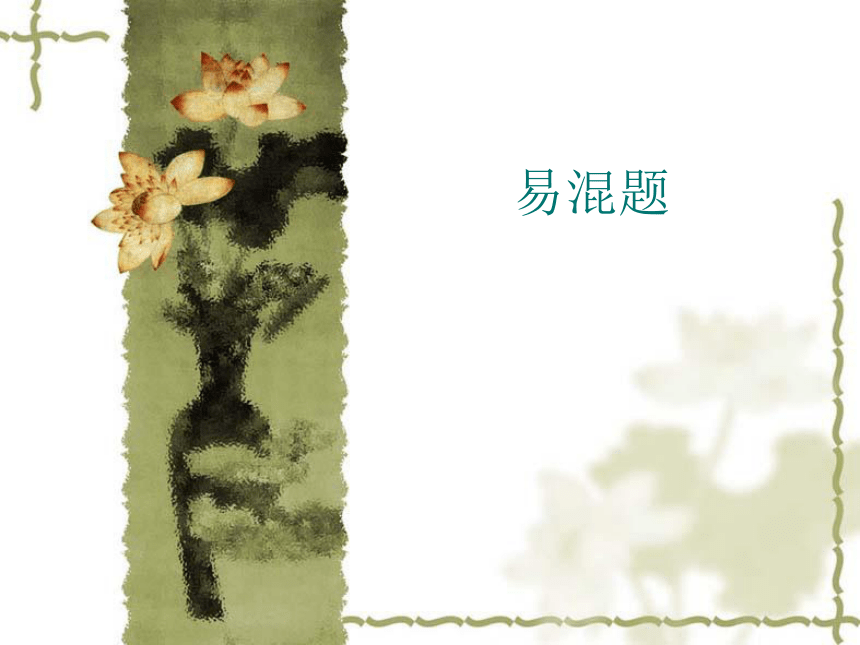
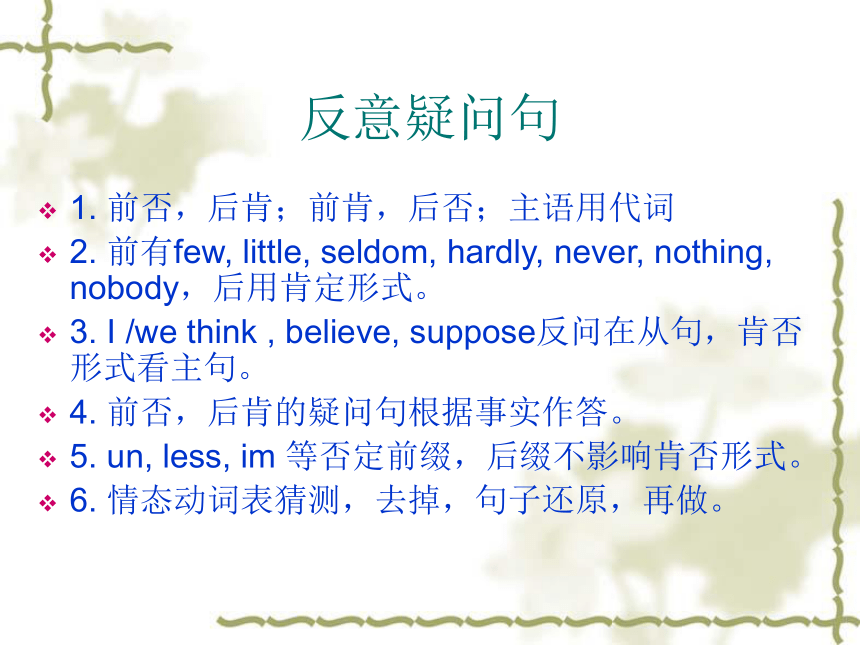
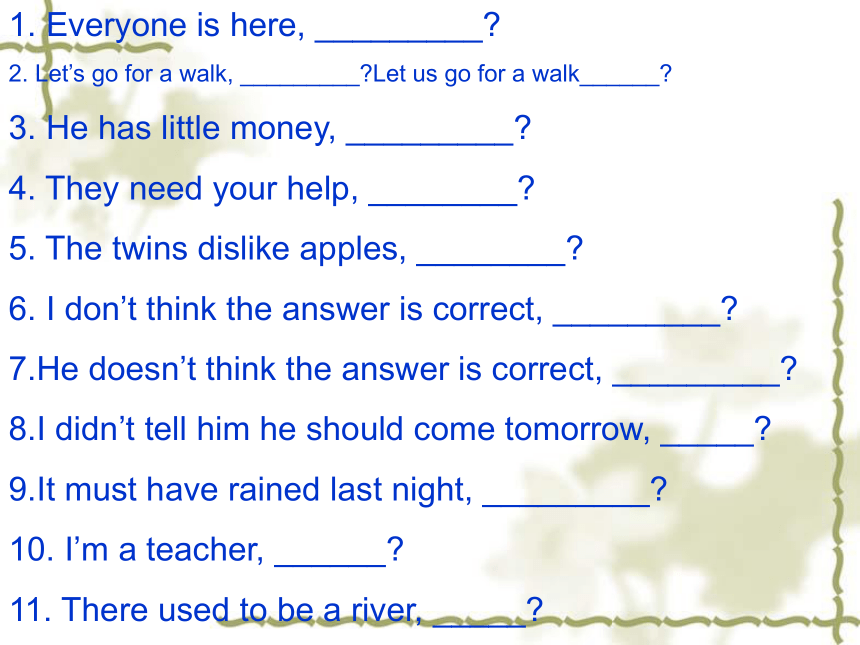
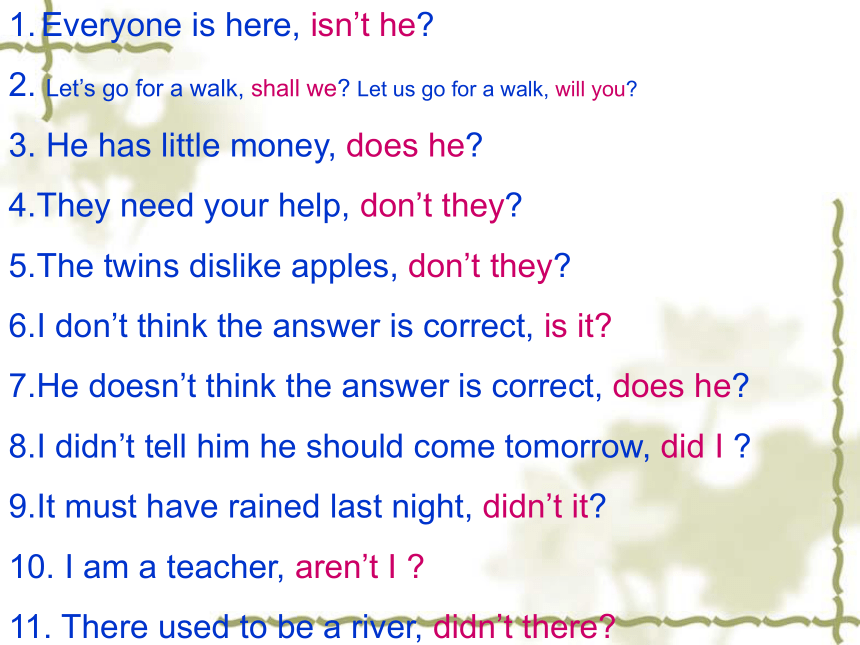
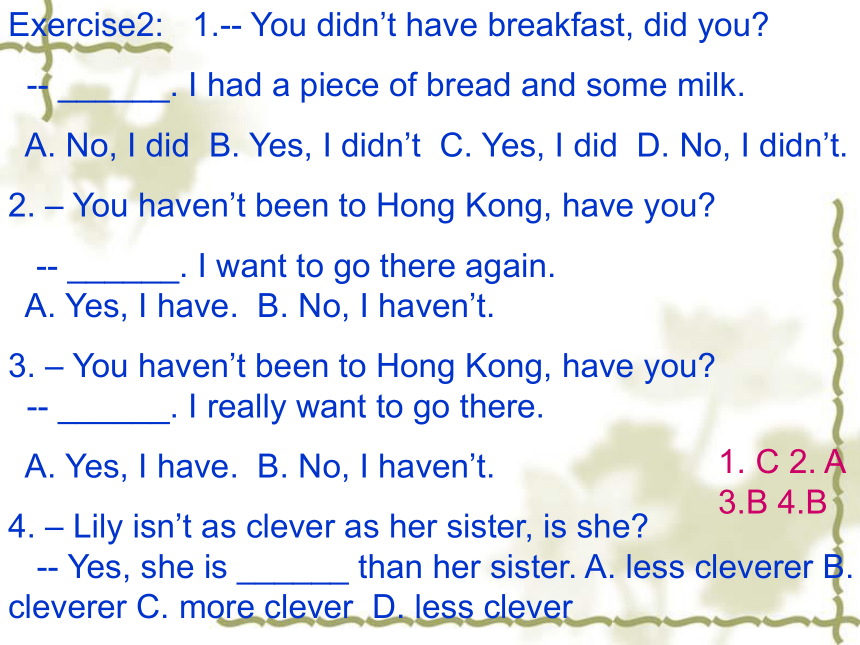
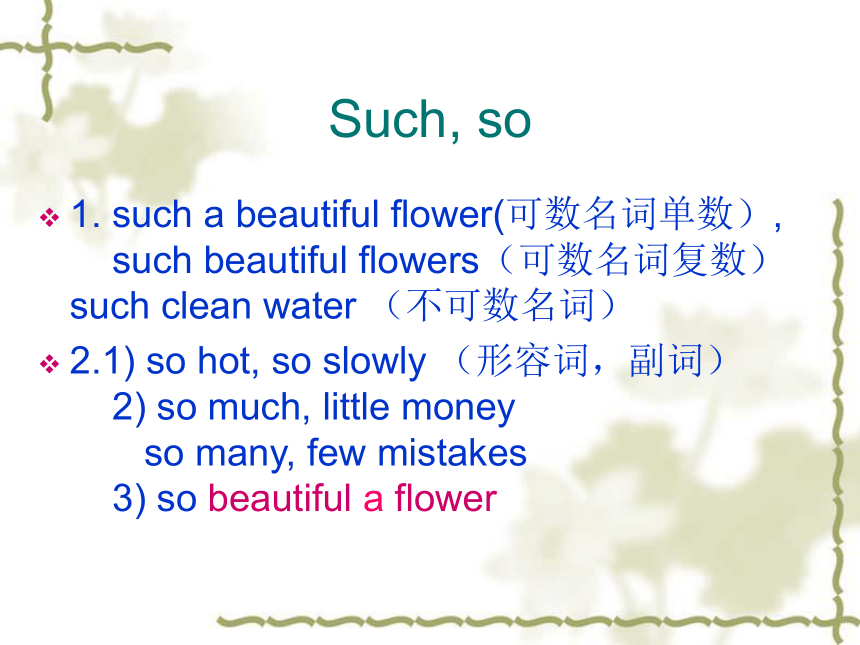
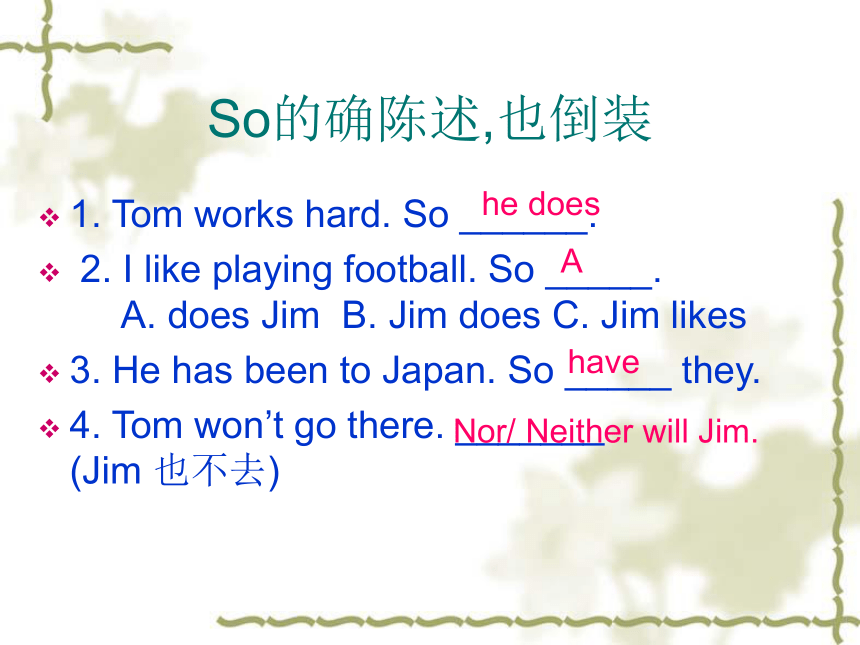
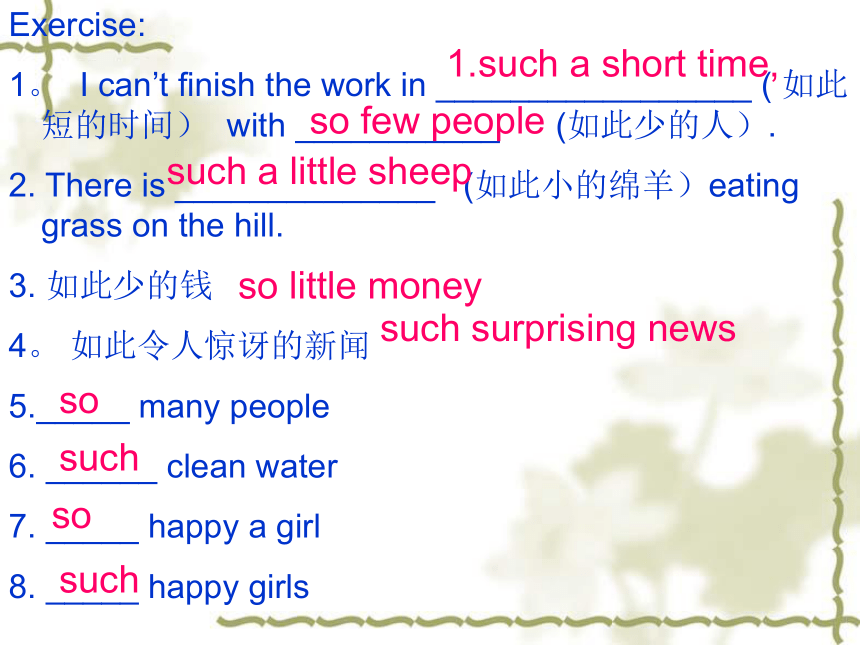
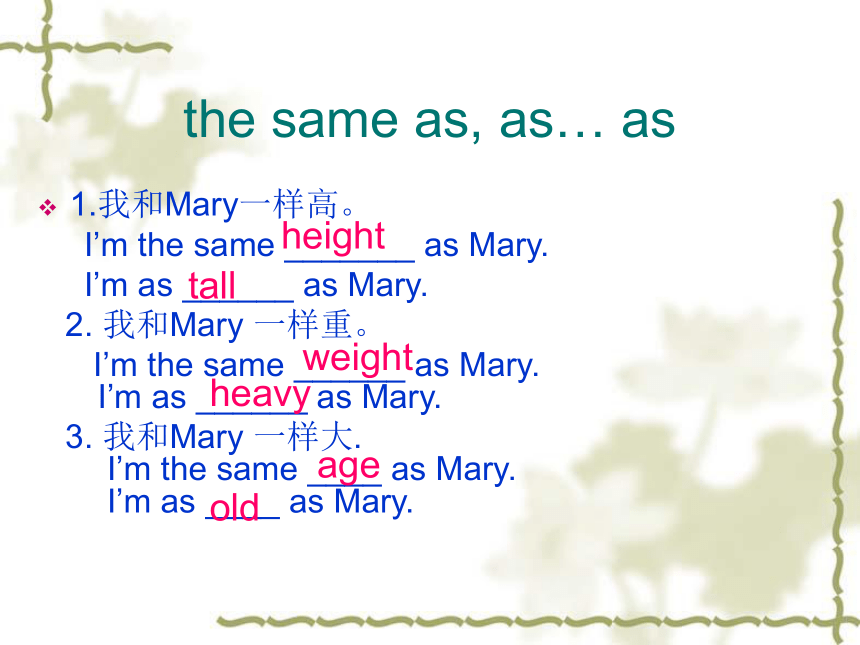
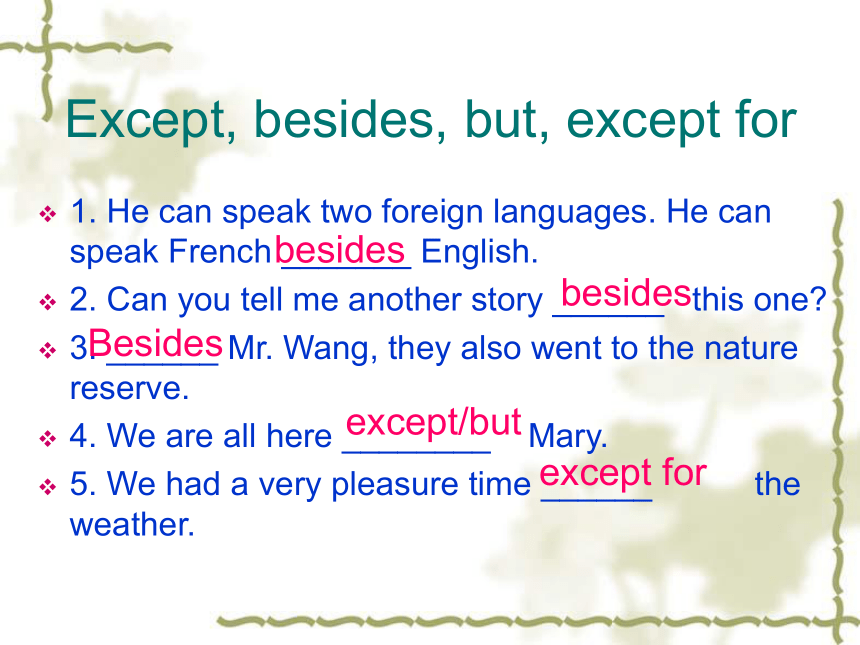
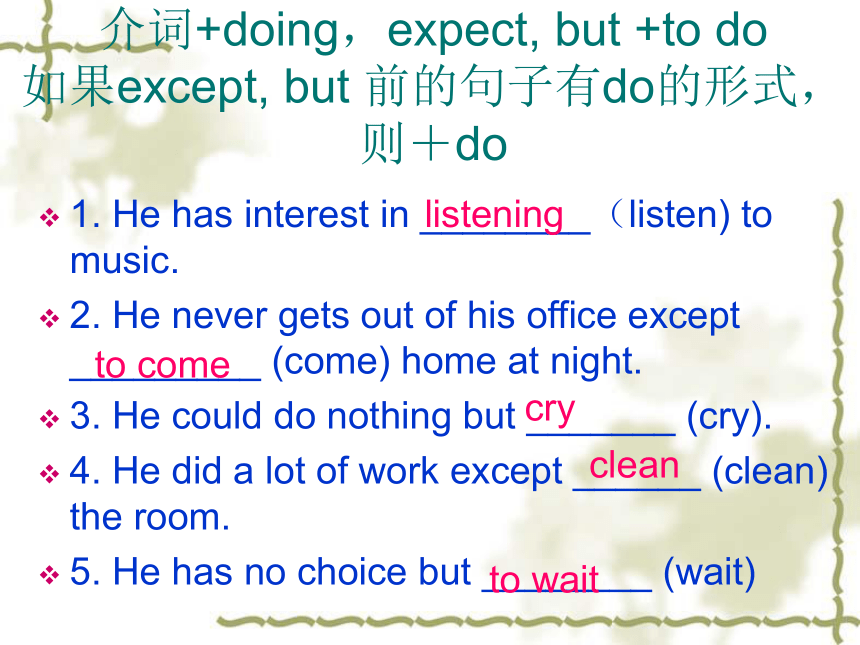
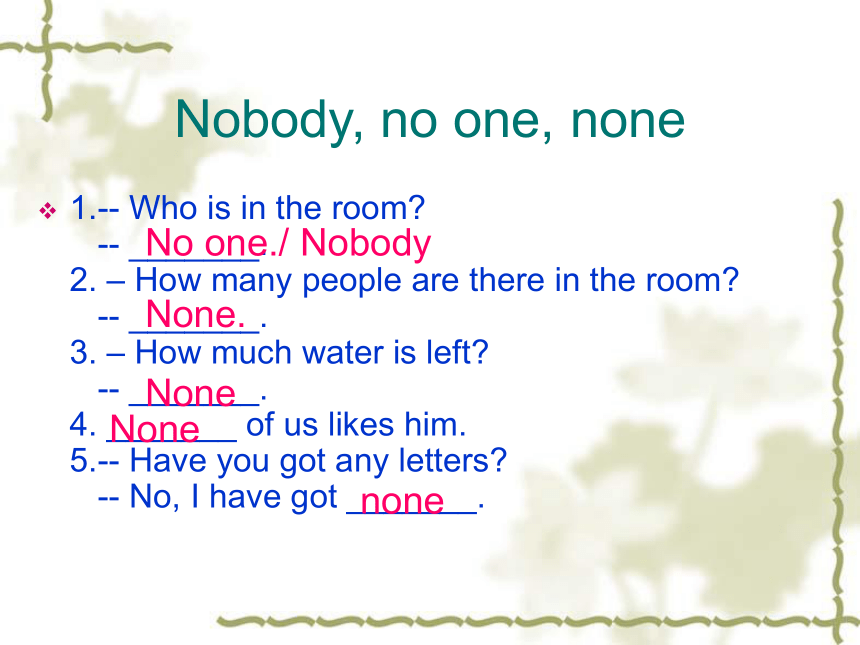
文档简介
课件83张PPT。易混题反意疑问句1. 前否,后肯;前肯,后否;主语用代词
2. 前有few, little, seldom, hardly, never, nothing, nobody,后用肯定形式。
3. I /we think , believe, suppose反问在从句,肯否形式看主句。
4. 前否,后肯的疑问句根据事实作答。
5. un, less, im 等否定前缀,后缀不影响肯否形式。
6. 情态动词表猜测,去掉,句子还原,再做。 1. Everyone is here, _________?
2. Let’s go for a walk, _________?Let us go for a walk______?
3. He has little money, _________?
4. They need your help, ________?
5. The twins dislike apples, ________?
6. I don’t think the answer is correct, _________?
7.He doesn’t think the answer is correct, _________?
8.I didn’t tell him he should come tomorrow, _____?
9.It must have rained last night, _________?
10. I’m a teacher, ______?
11. There used to be a river, _____?Everyone is here, isn’t he?
2. Let’s go for a walk, shall we? Let us go for a walk, will you?
3. He has little money, does he?
4.They need your help, don’t they?
5.The twins dislike apples, don’t they?
6.I don’t think the answer is correct, is it?
7.He doesn’t think the answer is correct, does he?
8.I didn’t tell him he should come tomorrow, did I ?
9.It must have rained last night, didn’t it?
10. I am a teacher, aren’t I ?
11. There used to be a river, didn’t there?Exercise2: 1.-- You didn’t have breakfast, did you?
-- ______. I had a piece of bread and some milk.
A. No, I did B. Yes, I didn’t C. Yes, I did D. No, I didn’t.
2. – You haven’t been to Hong Kong, have you?
-- ______. I want to go there again. A. Yes, I have. B. No, I haven’t.
3. – You haven’t been to Hong Kong, have you? -- ______. I really want to go there.
A. Yes, I have. B. No, I haven’t.
4. – Lily isn’t as clever as her sister, is she? -- Yes, she is ______ than her sister. A. less cleverer B. cleverer C. more clever D. less clever1. C 2. A 3.B 4.BSuch, so1. such a beautiful flower(可数名词单数), such beautiful flowers(可数名词复数) such clean water (不可数名词)
2.1) so hot, so slowly (形容词,副词) 2) so much, little money so many, few mistakes 3) so beautiful a flowerSo的确陈述,也倒装1. Tom works hard. So ______.
2. I like playing football. So _____. A. does Jim B. Jim does C. Jim likes
3. He has been to Japan. So _____ they.
4. Tom won’t go there. _______ (Jim 也不去)he doesAhaveNor/ Neither will Jim.Exercise:
1。 I can’t finish the work in _________________ ( 如此短的时间) with ___________ (如此少的人).
2. There is ______________ (如此小的绵羊)eating grass on the hill.
3. 如此少的钱
4。 如此令人惊讶的新闻
5._____ many people
6. ______ clean water
7. _____ happy a girl
8. _____ happy girls such a short time, so few peoplesuch a little sheepso little moneysuch surprising newssosuchsosuchthe same as, as… as 1.我和Mary一样高。
I’m the same _______ as Mary.
I’m as ______ as Mary.
2. 我和Mary 一样重。
I’m the same ______ as Mary. I’m as ______ as Mary.
3. 我和Mary 一样大. I’m the same ____ as Mary. I’m as ____ as Mary.heighttallweightheavyageoldExcept, besides, but, except for1. He can speak two foreign languages. He can speak French _______ English.
2. Can you tell me another story ______ this one?
3. ______ Mr. Wang, they also went to the nature reserve.
4. We are all here ________ Mary.
5. We had a very pleasure time ______ the weather.
besidesbesidesBesidesexcept/butexcept for介词+doing,expect, but +to do 如果except, but 前的句子有do的形式,则+do1. He has interest in ________(listen) to music.
2. He never gets out of his office except _________ (come) home at night.
3. He could do nothing but _______ (cry).
4. He did a lot of work except ______ (clean) the room.
5. He has no choice but ________ (wait)listeningto comecrycleanto waitNobody, no one, none1.-- Who is in the room? -- _______. 2. – How many people are there in the room? -- _______. 3. – How much water is left? -- _______. 4. _______ of us likes him. 5.-- Have you got any letters? -- No, I have got _______. No one./ NobodyNone.NoneNonenonemake1. 实意动词 1) make sb. sth. / make sth. for sb. 2) be made of 3) be made from 4) be made up of 5) be made into 6) be made in
2. 短语动词
1) make a living, make beds, make a fire
3. 使役动词 make sb. +adj. (make her happy)
make sb. do sth.
be made to do.
make sb. sth. (make her a doctor)
4. 同类:1)+省略to 的不定式
一感 feel 二听 listen to , hear
三让 make , let , have
四看 see, watch, notice, look at
半帮助 help被动:be made to do, be heard to do,
be seen to do, be watched to do
be noticed to do
复合宾语:make her happy, keep it open
find it difficult, set it free, hear the song sungThe workers were made _____ (work) 12 hours a day.
The boy was heard _____ (cry) last night.
I’ll have my father _____ (repair) the bike for me.
I’ll get someone _____ (finish) the work.
to workto cryrepairto finishThe boy make faces ______ (make) the baby_________ (laugh).
She was made ________ (wait) for a long time.
I made a card ______ (介词)for my mother.
to makelaughto waitfor MakeFind, make, let, keep的复合宾语1)He made his teacher ______ (angry) than last time.
2) The person was set ______(free) after two years in prison.
3) You should keep your eyes ______ (close) when you do the exercises.
4) We found it even _________ (difficult) to climb the mountain that before.
5)You need to keep the sheep _____ (safe).
6) We found him ______ (live) after the disaster.
7) You can’t leave your son _______ (lonely) at home.
angrierfreeclosedmore difficultsafealivealoneWhat, that1. Our city is no longer _____ it used to be.
2. Can you understand _____ I told you?
3. The old person might forget the things ____ he plans to say.
4. He might forget _____ he plans to say.
5. This is all ____ I can do for you.whatwhatthatwhatthatopen1. The school always ______ in September.
2. Last week, a new school ____________.
3. The school ___________ for two years.
4. You should keep the door ______ so that fresh air can come in the house.
5. _______ the door for us because it’s too hot in the room.openswas openedhas been openopenOpen使,让某人做某事1. have sb. do sth.
2. make sb. do sth.
3. let sb. do sth.
4. get sb. to do sth.
…某事被做,让别人做某事have sth. done
get sth. done
find sth. done
hear / see/ watch/ notice sth. done.Have 1. Do you have any questions _____ (ask)?
2. I have a lot of work ______ (do).
3.-- Did you have anyone _____ (water) the trees?– Yes, I had them ______ (water) this morning.
4. I had my bad teeth ______ (pull) this morning.
5. He has little money, _______?
6. He has written a book, ______ ?to askto dowaterwateredpulleddoes hehasn’t heUse, used1. 过去经常做某事
2. 习惯于做某事
3. 习惯于某物
4.被用来做某事
5. 被用来作为used to do sth.
be / get used to doing
be used to sth.
be used to do/ for doing
be used as 我父母过去住在农村,现在习惯住在城里.
我习惯了川菜.
这个刀子是用来切蛋糕的.
这个笔是用来作为礼物的.
这儿以前有个医院,是吗?My parents used to live in the countryside, but now they are used to living in the city.I’m used to Sichuan Food.The knife is used to cut cakes./ The knife is used for cutting cakes.The pen is used as a gift.There used to be a hospital, didn’t there?+doing, to do 有区别的1. After he finished the composition, he went on ________ (read) the book.
2. He tried ________ (mend) his shoes by himself.
3. He always forgets _______ (lock) the door, but he remembers ______ (lock) it last night.
4. When the teacher came in, the students stopped _________ (talk).
5. When the teacher came in, the students stopped _________ (study).to readmendingto locklockingtalkingto studyto + doing 1. look forward to doing
2. be used to doing
3. pay attention to doing
4. prefer doing to doing
5. get down to doing
6. make a contribution to doingThe day we looked forward to ______ (come) at last.
The day we’re looking forward to ______ (come ) before long.
Long before, they looked forward to _____ (come) to Yantai.
You should pay attention to _______ (listen) to the teacher carefully.
The girl used to ______ (be) afraid of eating Sichuan food, but now she is used to it.
Are you used to _______ (live) in China?camewill comecominglisteningbeliving连系动词1. 不用被动
2. 后面加形容词而不是副词
3. 种类:
1)look, sound, smell, feel, taste
2) get, become, turn, grow, go
3) stay, keep, remain
4) seem, appear1. His work seems _______ (mystery).
2. The food tastes _______. It has gone __________.mysteriousbadbad看似被动,但不用被动1. be worth doing
2. need doing (need to be done)
3. The book sells well. The pen writes well. The bike rides badly.
4. go up 上涨,被建起The book is worth _______ (read).
The patient isn’t worth _______ (operate) on.
Great changes __________ (take) place in the past few years/ so far.readingoperatinghave takenA lot of buildings __________ (go up) in the last few years.
This kind of book _______ (sell) well. And all the books ________ (sell) out.
The patient is too sick to be worth ___________(动手术).
The old man is worth ______________ (照顾).
This pen _________ (look) good, but writes _____(bad).
The classroom needs _________ (clean).
It _______ (sound) like a good idea.have gone upsellshave been soldoperating onlooking afterlooksbadlycleaningsoundsLeave, forget1. I ________ my homework at home.
2. Don’t ______ to bring your sister here next time.
3.你有什么落在家里吗? leftforgetDo you have anything left at home?Rise, rose, risen不加宾语,没有被动 raise, raised,raised加宾语,有被动1. Can you see some smoke _______ in the distance? Something must be burning.
2. He ______ his voice in order to be heard.
3. The teacher told us the sun _____ in the east.
4. The national flag ________ by the students every Monday morning.
5. The prices ________ a lot in the last few months.
6. 学生们正在看国旗升起.
risingraisedrisesis raisedhave risenStudents are watching the national flag rising. / being risen.Miss, lose, go, stealI found my wallet ________ (miss).
I found my wallet_________ (lose).
I found my wallet ________ (go).
I found my wallet _________ (steal)missinglostgonestolenSpend, pay, cost, take, buy1. I ______ a lot of money _____ the book.
2. I ______ a lot of money _____ the book.
3. I ______ the book ______ 20 yuan.
4. The book _____ me 20 yuan
5. The work _____ me two hours to finish.
6. How long does it _____ you to clean her room?
7. How much did you ____ for the book?spentonpaidforboughtforcosttooktakepayPay (paid, paid) pay sb. sm/ pay sm to sb. 付钱给某人
pay sb. sm/ pay sm to sb. for sth. 付钱给某人买某物 (for sb. 买人或赎人)
pay for sb.替某人付钱Her parents paid ____ her to go to the USA.
They tried to leave the restaurant without paying ______ their meal?
How much did you pay _______ your house?
You borrowed 100 yuan from me. You haven’t paid the money ____ me.
Have you paid the money _____ the bank yet?
He paid the terrorist (恐怖分子)$50000 ________ his kidnapped (被绑架的)son.
Have you paid _______ (for, /) the milkman?
forforfortotofor/end在…结尾处
最后
到…为止 at the end of
in the end
by the end ofThere was no place to sit, so they stood _____ the end of the meeting.
You can see the shop ____ the end of the street.
He cat died ____ the end.
____ the end of last week, they have learn 20 poems.tillatinByTake part in, join1. He ____________ the sports meeting last week, and he got the first prize in long jumping.
2. When did you __________ the army?took part injoin非延续性动词
非延续性动词
1)buy
2) borrow
3) close
4) open
5) come to, go to
6) move to
7) die
8) leave
9) wake
10) start, begin
现在完成时加一段时间改为延续性动词
have had , has had
have kept, has kept
have been closed, has been closed
have been open, has been open
have been in /on/ at, has been in/on/at
have lived in, has lived in
have been dead, has been dead
have been away (from), has been away from
have been awake, has been awake
have been on, has been on延续性动词
1.end
2.fall asleep, get to sleep
3.get up
4.come back
5.get back
6.reach, get to, arrive in
7.get to know
8.turn, get, become
9.hear from
10.join
11. marry sb.现在完成时加一段时间改为延续性动词
have been over, has been over
have been asleep, has been asleep
have been up, has been up
have been back, has been back
have been back, has been back
have been in/ on/ at, has been in /on/ at)
have been known, has been known
have been, has been
have/has had a letter from
have/has been a ……. member, have/has been a member of…,, have/ has been in
11. have been married to sb./ has been married to sb.1.When he arrived at the bus stop, the bus ________ for 20 minutes.
A. has left B. had left C. has been away D. had been away
2. I ______ the League for 5 years so far.
A. joined B. have joined C. have been in
3.The factory ________ since the February of 1988.
A . has been open B. has opened C. was open D. opened
4.Mary and Rose _______friends since they met in 2000.
A. have made B. have been C. made D. have become
5.You mustn't ________ until he comes back.
A. be away B. leave C. be left
6.The meeting _______ for a week now.
A. has finished B. has ended C. has been over
7.Miss Gao ______ this school for nearly 5 years.
A. has been in B. has come to C. has taught
8.Ben ______ a teacher for 4 years .
A. has been B. has become C. was D. becameDcABBcAA9. I ______ home for a week.
A. have returned B. have been back C. returned
10. How long _______ he ________ ?
A. died B. has, died C. has, been dead
11. He ______ at eight yesterday afternoon.
A. slept B. was sleeping C. has sleep D. had slept
12.He ________ the car for a week.
A. bought B. has bought C. has had
13.-----How long _____ you _____ ill ? -----Two weeks.
A. did fall B. have, fell C. have, been
14.Since 2000, he _____ his hometown.
A. has left B. has moved away C. has been away from
15.I'll lend you the book , but you can only _____ it for 2 days.
A. borrow B. keep C. take
16.The bus ______ on the road for 2 hours so far.
A. has stopped B. stopped C. has been
17.Are you _____ the jacket these days?
A. wearing B. putting on C. dressing D. onBCBCccBcA18.He ________ for 2 hours.
A. got up B. has got up C. has been up
19. Tom is ill in hospital. He _______ a cold for several days.
A. is B. catches C. has caught D. has had
20.----- How long can I ______ the book? ------ Two weeks.
A. borrow B. lend C. get D. keep
cDD时态The boy is always ______ (forget) his keys.
The train ______ (leave) at 9 o’clock, so you needn’t hurry.
Will your wife come to the party? If your wife _____ (do), so _______.
He_____ (call) you as soon as he ____ (get) there.
He said he ____________ (not leave) until his father _____ (come) back.
I __________(not, stand) up unless you _____ (tell) me the answer.
The teacher __________(start) the class unless the blackboard ________ (clean).forgettingleavesdoeswill minewill callgets wouldn’t leavecamewon’t standtellwon’t startis cleanedlieHe ______ (lie) on the bed, looking at the ceiling.
Did you tell us a ______?
There is a wallet _______ on the ground.
You ______ to us. You didn’t tell the truth.
______ in the sun, he looked rather relaxed.laylielyingliedLying Lie in(处于…内部), lie to(处于…外部), lie on(与…接壤)Hubei lies _____ Hunan.
Taiwan lies _____ the southeast of China.
Taiwan lies _____ the southeast of Fujian.
China lies ____the west of North Korea.
China lies ____ the west of South Korea.
China lies _____ the west of Japan.
onintoontotokind1. It’s kind ____ you to say so.
2. The old man is kind _____ us.
3. It’s wrong ____ you to play in the street.
4. It’s friendly ____ him to show us around.
5. He is friendly _____ us.
6. It’s important _____ him to study English.
7. Good health is important ____ everyone.
8. Education is important ____ my future.
9. It’s difficult ____ us to work it out in such a short time.
10. He has no difficulty ______ the problem.oftoofoftofortoforforwithThat, which 定语从句1. 定语从句中关系词只用that 不用which的情况。 1)先行词为all, everything, nothing, something, anything, little, much等不定代词时。
I’m sure she has something (that) you can borrow. 2) 先行词被all, every, no, some, any, little, much 修饰时。
I’ve read all the book that you gave me. 3)先行词被序数词或形容词最高级修饰时。 This is the best novel that I have ever read. 4)先行词被the only, the very, the same, the last修饰时。 The last place that we visited was the museum. 5) 当有两个或两个以上分别表示人和物的先行词时,这个定语从句要用that 而不能用which 或who 引导。 He talked about the teachers and schools that he had visited. 6) 当主句是以who 或which 开头的特殊疑问句时,定语从句要用that.
Who is the person that is standing at the gate?
2. 只用which 不用that 的情况。
1)非限制性定语从句中,前面有逗号。
The boy kept ______ (ask) strange questions, ______ made the teacher angry.
2) 在介词的后面。
Look at the tree to _______ he is _______ (tie) his horse.
Exercises:
( ) 1. When I grow up, I am going to do something ____ I want to do.
A. that B. what C. which D. how
askingwhichwhichtyingA定语从句中that, which, where 区别This is the hotel ____ we stayed last time.
This is the hotel __________ we stayed in last time.
This is the hotel in _____ we stayed last time.
I will never forget the place __________ we visited last summer.wherethat/which/ /whichthat/ which/ /That, which, when 的区别1. Do you remember the day ____ he joined the army?
2. Do you remember the days _________ we spent on the farm?when that/which//定语从句谓语动词1. I like movies that _______ happy. A. make me B. makes me C. is D. are
2. I like music that Thomas ______ . A. write B. writes C. writing D. writes it.AB关系词是从句的主语,谓语动词(make)和先行词(movies) 相一致。名词复数roof,
数词 in one’s teens
in one’s twenties
in the 1980s/1980’s
on his twelfth birthday
on his twentieth birthday
two thirds, one fourth, three quarters,four fifths在某人十几岁的时候
在某人二十几岁的时候
在20世纪80年代
在他12岁生日那天
在他20岁生日那天
三分之二,四分之一,四分之三,五分之四不可数名词用于感叹句1.Weather, fun, information, newsA, anA useful book
A European
An uncle,
An honest boy
A university
find, look for, find out, found, 1. 中国成立于己于人1949年.
2. 他在找他的书但是还没有找到.
3. 你找出是谁打碎玻璃的吗? China was founded in 1949.He is looking for his book but he hasn’t found it.Have you found out who broke the glass?Bit, littleAre you tired? Not a bit. = Not at all.
Are you tired? Not a little. = very
She is a little/bit tired.
There is ______ bread on the table. A. a bit B. a little of C. a bit of D. little of cHear, see, watch, notice+doing 表示正在做某事 (just now)
+ do 表示一个过程 (often)
+ being done 被动,正在进行
+ done 被动,一个过程1. I have saw him _____ (go) upstairs.
2. Listen! Can you hear anybody _____ (cry) in the street?
3. – Where were you just now? -- I was watching my shoes _______ (repair).
4. Did you notice a thief _______ (slide) in the room?
5. My mother often watches me _____ (practice) the piano.gocryingbeing repairedslidepracticesound, sound like1) It _________ good.
2) It _________ a good idea.soundssounds like词性 1). He made progress in English. It’s _______. A. a success B. success C. succeed 2) He _________ in reaching the top of the mountain. 3) The photo wasn’t clear. It was taken ____________ than that one. 4) The treatment was greatly __________. 5) How ________ he did the work!
1.success, succeed, successful, successfullyAsucceededless successfullysuccessfulsuccessfully2.Die, died, died, dying, dead, deathThe ______ cat was found _____ the next morning.
He has been ______ for two years.
The family moved to Beijing after the _____ of the father.
He ______ from hunger.deaddyingdeaddeathdied3. care, careful, carefully, carefulness, careless, carelessly, carelessness1. You should take good _____ of the child.
2. Who _____ about it?
3. Who do you think is ___________ of the two?
4. The _______ you are, the fewer mistakes you’ll make.
5. The ________ you write, the better your handwriting looks.
6.The accident happened because of the ________ of the driver.
7. Tom made the most mistakes in the exam. No one is _____________ than him in the class.
8. How ________ a girl she is!carecaresthe more carefulmore carefulmore carefullycarelessnessmore carelesscareful1.agree with sb.同意某人,某人的观点
2.agree to sth. 赞同某建议,安排等
3. agree on sth.就某时间、地点、人物等取得一致意见
4. agree to do sth.同意做某事
5. agree that…同意 agree1. He agreed ____ our plan.
2. We agreed ____ a date for the next meeting.
3. I quite agree _____ you ____ that point.
4. He agreed ______ (help) me with my physics.
5. 他同意我们再试一次。toonwithonto helpHe agreed that we tried again.In, afterIn后接时间的短语,用于将来时,表在一段时间之内,或在一段时间之后。
After后接时间的短语,常用在过去时中。
Will your sister come back _____ an hour? A. in B. after
Where ____ you _____ (go) after two weeks?indid goSoon, quickly, fast, earlySoon 指时间上快
Quickly, fast指动作迅速
Early 指时间段上的早 early in the morning
1. The new is ________ (excite). We were ________ (excite) at the news.
2. _______ (take) a dictionary, she began to prepare her lessons.
3. I heard someone _______ (open) the door.
4. I heard the door __________ (open).
5. He picked up a ________ (fall) leave.
6. This is a novel________ (write) by a 19th century write.
7. When I entered the room, I found her ________ (write) something.
8. ________ (give) enough time, we can do it well too.非谓语动词excitingexcitedTakingopenopenedfallenwrittenwritingGiven9. Mother _______ (be) ill, I had to stay at home.
10. We live in a city _______ (call) Yantai.
11. Look at the girl ________ (sit) under the tree.
12. They built a road _______ (lead) to the country.
13. Suddenly there appear a young woman ________ (dress) in green.
14. The house ________ (belong) to John stands by he river.
15. ________ (walk) through the park, we saw a lot of roses.
16. ________ (look) from the moon, the earth is a blue ball.
17. ________ (follow) Tom, they started to climb.18. He entered the room ________ (follow) by a dog.
19. _________ (not know) her address, we couldn’t get in touch with her.
20. ________ (see) nobody at home, she decided to leave them a note.
21. _________ (see) the film twice, she didn’t want to go to the cinema.
22. _________ (hear) the news, they all jumped with joy.
23. Don’t mention this while _________ (talk) to him.
24. _________ (encourage) by her words, he decided to learn English.
25. __________ (build) in 1192, the bridge is over 700 years old.
26. She walked along the street, ________ (not know) where to go.
27. ______ (look) from the moon, the earth with water ______ (cover) seventy percent of its surface, appears as a “blue ball”.
Put on, wear, have…on, dress, be in1. We are going to work on the farm. Please ______ your old clothes.
2. The Emperor ______ nothing _____.
3. ________ more clothes, or you’ll catch a cold.
4. Li Mei likes ________ a blue skirt.
5. Mr. Black _______ a pair of thick glasses.
6. She _______ red today.
7. She is ________ a red skirt today.put onhadonPut onwearingwearsis inwearingOne, it, that, ones, those1. The population of China is larger than _______ in France.
2. I have two books, a thick _____ and a thin _______.
3. He had 50 sheep. Twenty _______ were killed last week.
4. The students in this school are cleverer than _______ in that school.
5. I have an interesting book. Would you like to read ______?
6. I have bought a new watch. My old _____ doesn’t work. that
one
one
ones
thoseitoneWhen , while ,as 1 .He was listening to music _____ he was doing his homework.
2. It was dark _____ they came out of the last shop.
3. It’s getting colder and colder _____ the winter comes.
4. She came along _____ she sang.
5. _____ he grew older, he lost interest in everything.While/whenwhenasasAs Watch, see, look (at), read1. Do you like to play or just _____?
2. You should ______ the experiment carefully and take down the result.
3. He _____ around but _____ nothing.
4. He ________ my picture carefully.
5. ______ what I do, then do it again.
6.He _______ to be a rich man.
7. It’s a good book for children _______.watchwatchlookedsawlooked at Watch looksto readKeep, borrow, lend1. Who ______ the bike to you?
2. You can _____ the book for a long time.
3. He ________ the bike from his neighbor last week. He ________ it for six days.
lentkeepborrowedhas keptBring, fetch, take1. ______ me some apples, please.
2. When you come next time, ____ your sister with you.
3. It’s going to rain. _____ the umbrella with you.
4. She ______ her son from the kindergarten every afternoon.Bring bring TakefetchesWish, hope1. She _______ he will be a doctor in the future.
2. I ______ him to be a doctor in the future.
3. I ______ I could fly.wishes/hopeswishwishSpeak, say, talk1. What did he ____ at the meeting?
2. Who will _____ at the meeting?
3. Please don’t _____ so loudly.sayspeaktalkA pair of, a box of, a group of1. There _______ (be) a pair of shoes on the table.
2. A box of apple _____ (be) on the table.
3. A plate of grapes ______ (eat) by Dick.
4. A group of children __________ (cross) the road now.
5. This pair of glasses ______ (be) cheap. You can take ______.
6. This pair of trousers _____ (be) in your size. You may try ______ on.isiswas eatenare crossingisthemisthem不及物动词做定语等1. The chair is comfortable to sit on.
2. The song is beautiful to listen to .
3. The picture is nice to look at.
4. This is the hospital that he stays in/ at.
5. The pen is good to write with.
6. The man is hard to get along with.
7. The room is large enough for us to live in.
2. 前有few, little, seldom, hardly, never, nothing, nobody,后用肯定形式。
3. I /we think , believe, suppose反问在从句,肯否形式看主句。
4. 前否,后肯的疑问句根据事实作答。
5. un, less, im 等否定前缀,后缀不影响肯否形式。
6. 情态动词表猜测,去掉,句子还原,再做。 1. Everyone is here, _________?
2. Let’s go for a walk, _________?Let us go for a walk______?
3. He has little money, _________?
4. They need your help, ________?
5. The twins dislike apples, ________?
6. I don’t think the answer is correct, _________?
7.He doesn’t think the answer is correct, _________?
8.I didn’t tell him he should come tomorrow, _____?
9.It must have rained last night, _________?
10. I’m a teacher, ______?
11. There used to be a river, _____?Everyone is here, isn’t he?
2. Let’s go for a walk, shall we? Let us go for a walk, will you?
3. He has little money, does he?
4.They need your help, don’t they?
5.The twins dislike apples, don’t they?
6.I don’t think the answer is correct, is it?
7.He doesn’t think the answer is correct, does he?
8.I didn’t tell him he should come tomorrow, did I ?
9.It must have rained last night, didn’t it?
10. I am a teacher, aren’t I ?
11. There used to be a river, didn’t there?Exercise2: 1.-- You didn’t have breakfast, did you?
-- ______. I had a piece of bread and some milk.
A. No, I did B. Yes, I didn’t C. Yes, I did D. No, I didn’t.
2. – You haven’t been to Hong Kong, have you?
-- ______. I want to go there again. A. Yes, I have. B. No, I haven’t.
3. – You haven’t been to Hong Kong, have you? -- ______. I really want to go there.
A. Yes, I have. B. No, I haven’t.
4. – Lily isn’t as clever as her sister, is she? -- Yes, she is ______ than her sister. A. less cleverer B. cleverer C. more clever D. less clever1. C 2. A 3.B 4.BSuch, so1. such a beautiful flower(可数名词单数), such beautiful flowers(可数名词复数) such clean water (不可数名词)
2.1) so hot, so slowly (形容词,副词) 2) so much, little money so many, few mistakes 3) so beautiful a flowerSo的确陈述,也倒装1. Tom works hard. So ______.
2. I like playing football. So _____. A. does Jim B. Jim does C. Jim likes
3. He has been to Japan. So _____ they.
4. Tom won’t go there. _______ (Jim 也不去)he doesAhaveNor/ Neither will Jim.Exercise:
1。 I can’t finish the work in _________________ ( 如此短的时间) with ___________ (如此少的人).
2. There is ______________ (如此小的绵羊)eating grass on the hill.
3. 如此少的钱
4。 如此令人惊讶的新闻
5._____ many people
6. ______ clean water
7. _____ happy a girl
8. _____ happy girls such a short time, so few peoplesuch a little sheepso little moneysuch surprising newssosuchsosuchthe same as, as… as 1.我和Mary一样高。
I’m the same _______ as Mary.
I’m as ______ as Mary.
2. 我和Mary 一样重。
I’m the same ______ as Mary. I’m as ______ as Mary.
3. 我和Mary 一样大. I’m the same ____ as Mary. I’m as ____ as Mary.heighttallweightheavyageoldExcept, besides, but, except for1. He can speak two foreign languages. He can speak French _______ English.
2. Can you tell me another story ______ this one?
3. ______ Mr. Wang, they also went to the nature reserve.
4. We are all here ________ Mary.
5. We had a very pleasure time ______ the weather.
besidesbesidesBesidesexcept/butexcept for介词+doing,expect, but +to do 如果except, but 前的句子有do的形式,则+do1. He has interest in ________(listen) to music.
2. He never gets out of his office except _________ (come) home at night.
3. He could do nothing but _______ (cry).
4. He did a lot of work except ______ (clean) the room.
5. He has no choice but ________ (wait)listeningto comecrycleanto waitNobody, no one, none1.-- Who is in the room? -- _______. 2. – How many people are there in the room? -- _______. 3. – How much water is left? -- _______. 4. _______ of us likes him. 5.-- Have you got any letters? -- No, I have got _______. No one./ NobodyNone.NoneNonenonemake1. 实意动词 1) make sb. sth. / make sth. for sb. 2) be made of 3) be made from 4) be made up of 5) be made into 6) be made in
2. 短语动词
1) make a living, make beds, make a fire
3. 使役动词 make sb. +adj. (make her happy)
make sb. do sth.
be made to do.
make sb. sth. (make her a doctor)
4. 同类:1)+省略to 的不定式
一感 feel 二听 listen to , hear
三让 make , let , have
四看 see, watch, notice, look at
半帮助 help被动:be made to do, be heard to do,
be seen to do, be watched to do
be noticed to do
复合宾语:make her happy, keep it open
find it difficult, set it free, hear the song sungThe workers were made _____ (work) 12 hours a day.
The boy was heard _____ (cry) last night.
I’ll have my father _____ (repair) the bike for me.
I’ll get someone _____ (finish) the work.
to workto cryrepairto finishThe boy make faces ______ (make) the baby_________ (laugh).
She was made ________ (wait) for a long time.
I made a card ______ (介词)for my mother.
to makelaughto waitfor MakeFind, make, let, keep的复合宾语1)He made his teacher ______ (angry) than last time.
2) The person was set ______(free) after two years in prison.
3) You should keep your eyes ______ (close) when you do the exercises.
4) We found it even _________ (difficult) to climb the mountain that before.
5)You need to keep the sheep _____ (safe).
6) We found him ______ (live) after the disaster.
7) You can’t leave your son _______ (lonely) at home.
angrierfreeclosedmore difficultsafealivealoneWhat, that1. Our city is no longer _____ it used to be.
2. Can you understand _____ I told you?
3. The old person might forget the things ____ he plans to say.
4. He might forget _____ he plans to say.
5. This is all ____ I can do for you.whatwhatthatwhatthatopen1. The school always ______ in September.
2. Last week, a new school ____________.
3. The school ___________ for two years.
4. You should keep the door ______ so that fresh air can come in the house.
5. _______ the door for us because it’s too hot in the room.openswas openedhas been openopenOpen使,让某人做某事1. have sb. do sth.
2. make sb. do sth.
3. let sb. do sth.
4. get sb. to do sth.
…某事被做,让别人做某事have sth. done
get sth. done
find sth. done
hear / see/ watch/ notice sth. done.Have 1. Do you have any questions _____ (ask)?
2. I have a lot of work ______ (do).
3.-- Did you have anyone _____ (water) the trees?– Yes, I had them ______ (water) this morning.
4. I had my bad teeth ______ (pull) this morning.
5. He has little money, _______?
6. He has written a book, ______ ?to askto dowaterwateredpulleddoes hehasn’t heUse, used1. 过去经常做某事
2. 习惯于做某事
3. 习惯于某物
4.被用来做某事
5. 被用来作为used to do sth.
be / get used to doing
be used to sth.
be used to do/ for doing
be used as 我父母过去住在农村,现在习惯住在城里.
我习惯了川菜.
这个刀子是用来切蛋糕的.
这个笔是用来作为礼物的.
这儿以前有个医院,是吗?My parents used to live in the countryside, but now they are used to living in the city.I’m used to Sichuan Food.The knife is used to cut cakes./ The knife is used for cutting cakes.The pen is used as a gift.There used to be a hospital, didn’t there?+doing, to do 有区别的1. After he finished the composition, he went on ________ (read) the book.
2. He tried ________ (mend) his shoes by himself.
3. He always forgets _______ (lock) the door, but he remembers ______ (lock) it last night.
4. When the teacher came in, the students stopped _________ (talk).
5. When the teacher came in, the students stopped _________ (study).to readmendingto locklockingtalkingto studyto + doing 1. look forward to doing
2. be used to doing
3. pay attention to doing
4. prefer doing to doing
5. get down to doing
6. make a contribution to doingThe day we looked forward to ______ (come) at last.
The day we’re looking forward to ______ (come ) before long.
Long before, they looked forward to _____ (come) to Yantai.
You should pay attention to _______ (listen) to the teacher carefully.
The girl used to ______ (be) afraid of eating Sichuan food, but now she is used to it.
Are you used to _______ (live) in China?camewill comecominglisteningbeliving连系动词1. 不用被动
2. 后面加形容词而不是副词
3. 种类:
1)look, sound, smell, feel, taste
2) get, become, turn, grow, go
3) stay, keep, remain
4) seem, appear1. His work seems _______ (mystery).
2. The food tastes _______. It has gone __________.mysteriousbadbad看似被动,但不用被动1. be worth doing
2. need doing (need to be done)
3. The book sells well. The pen writes well. The bike rides badly.
4. go up 上涨,被建起The book is worth _______ (read).
The patient isn’t worth _______ (operate) on.
Great changes __________ (take) place in the past few years/ so far.readingoperatinghave takenA lot of buildings __________ (go up) in the last few years.
This kind of book _______ (sell) well. And all the books ________ (sell) out.
The patient is too sick to be worth ___________(动手术).
The old man is worth ______________ (照顾).
This pen _________ (look) good, but writes _____(bad).
The classroom needs _________ (clean).
It _______ (sound) like a good idea.have gone upsellshave been soldoperating onlooking afterlooksbadlycleaningsoundsLeave, forget1. I ________ my homework at home.
2. Don’t ______ to bring your sister here next time.
3.你有什么落在家里吗? leftforgetDo you have anything left at home?Rise, rose, risen不加宾语,没有被动 raise, raised,raised加宾语,有被动1. Can you see some smoke _______ in the distance? Something must be burning.
2. He ______ his voice in order to be heard.
3. The teacher told us the sun _____ in the east.
4. The national flag ________ by the students every Monday morning.
5. The prices ________ a lot in the last few months.
6. 学生们正在看国旗升起.
risingraisedrisesis raisedhave risenStudents are watching the national flag rising. / being risen.Miss, lose, go, stealI found my wallet ________ (miss).
I found my wallet_________ (lose).
I found my wallet ________ (go).
I found my wallet _________ (steal)missinglostgonestolenSpend, pay, cost, take, buy1. I ______ a lot of money _____ the book.
2. I ______ a lot of money _____ the book.
3. I ______ the book ______ 20 yuan.
4. The book _____ me 20 yuan
5. The work _____ me two hours to finish.
6. How long does it _____ you to clean her room?
7. How much did you ____ for the book?spentonpaidforboughtforcosttooktakepayPay (paid, paid) pay sb. sm/ pay sm to sb. 付钱给某人
pay sb. sm/ pay sm to sb. for sth. 付钱给某人买某物 (for sb. 买人或赎人)
pay for sb.替某人付钱Her parents paid ____ her to go to the USA.
They tried to leave the restaurant without paying ______ their meal?
How much did you pay _______ your house?
You borrowed 100 yuan from me. You haven’t paid the money ____ me.
Have you paid the money _____ the bank yet?
He paid the terrorist (恐怖分子)$50000 ________ his kidnapped (被绑架的)son.
Have you paid _______ (for, /) the milkman?
forforfortotofor/end在…结尾处
最后
到…为止 at the end of
in the end
by the end ofThere was no place to sit, so they stood _____ the end of the meeting.
You can see the shop ____ the end of the street.
He cat died ____ the end.
____ the end of last week, they have learn 20 poems.tillatinByTake part in, join1. He ____________ the sports meeting last week, and he got the first prize in long jumping.
2. When did you __________ the army?took part injoin非延续性动词
非延续性动词
1)buy
2) borrow
3) close
4) open
5) come to, go to
6) move to
7) die
8) leave
9) wake
10) start, begin
现在完成时加一段时间改为延续性动词
have had , has had
have kept, has kept
have been closed, has been closed
have been open, has been open
have been in /on/ at, has been in/on/at
have lived in, has lived in
have been dead, has been dead
have been away (from), has been away from
have been awake, has been awake
have been on, has been on延续性动词
1.end
2.fall asleep, get to sleep
3.get up
4.come back
5.get back
6.reach, get to, arrive in
7.get to know
8.turn, get, become
9.hear from
10.join
11. marry sb.现在完成时加一段时间改为延续性动词
have been over, has been over
have been asleep, has been asleep
have been up, has been up
have been back, has been back
have been back, has been back
have been in/ on/ at, has been in /on/ at)
have been known, has been known
have been, has been
have/has had a letter from
have/has been a ……. member, have/has been a member of…,, have/ has been in
11. have been married to sb./ has been married to sb.1.When he arrived at the bus stop, the bus ________ for 20 minutes.
A. has left B. had left C. has been away D. had been away
2. I ______ the League for 5 years so far.
A. joined B. have joined C. have been in
3.The factory ________ since the February of 1988.
A . has been open B. has opened C. was open D. opened
4.Mary and Rose _______friends since they met in 2000.
A. have made B. have been C. made D. have become
5.You mustn't ________ until he comes back.
A. be away B. leave C. be left
6.The meeting _______ for a week now.
A. has finished B. has ended C. has been over
7.Miss Gao ______ this school for nearly 5 years.
A. has been in B. has come to C. has taught
8.Ben ______ a teacher for 4 years .
A. has been B. has become C. was D. becameDcABBcAA9. I ______ home for a week.
A. have returned B. have been back C. returned
10. How long _______ he ________ ?
A. died B. has, died C. has, been dead
11. He ______ at eight yesterday afternoon.
A. slept B. was sleeping C. has sleep D. had slept
12.He ________ the car for a week.
A. bought B. has bought C. has had
13.-----How long _____ you _____ ill ? -----Two weeks.
A. did fall B. have, fell C. have, been
14.Since 2000, he _____ his hometown.
A. has left B. has moved away C. has been away from
15.I'll lend you the book , but you can only _____ it for 2 days.
A. borrow B. keep C. take
16.The bus ______ on the road for 2 hours so far.
A. has stopped B. stopped C. has been
17.Are you _____ the jacket these days?
A. wearing B. putting on C. dressing D. onBCBCccBcA18.He ________ for 2 hours.
A. got up B. has got up C. has been up
19. Tom is ill in hospital. He _______ a cold for several days.
A. is B. catches C. has caught D. has had
20.----- How long can I ______ the book? ------ Two weeks.
A. borrow B. lend C. get D. keep
cDD时态The boy is always ______ (forget) his keys.
The train ______ (leave) at 9 o’clock, so you needn’t hurry.
Will your wife come to the party? If your wife _____ (do), so _______.
He_____ (call) you as soon as he ____ (get) there.
He said he ____________ (not leave) until his father _____ (come) back.
I __________(not, stand) up unless you _____ (tell) me the answer.
The teacher __________(start) the class unless the blackboard ________ (clean).forgettingleavesdoeswill minewill callgets wouldn’t leavecamewon’t standtellwon’t startis cleanedlieHe ______ (lie) on the bed, looking at the ceiling.
Did you tell us a ______?
There is a wallet _______ on the ground.
You ______ to us. You didn’t tell the truth.
______ in the sun, he looked rather relaxed.laylielyingliedLying Lie in(处于…内部), lie to(处于…外部), lie on(与…接壤)Hubei lies _____ Hunan.
Taiwan lies _____ the southeast of China.
Taiwan lies _____ the southeast of Fujian.
China lies ____the west of North Korea.
China lies ____ the west of South Korea.
China lies _____ the west of Japan.
onintoontotokind1. It’s kind ____ you to say so.
2. The old man is kind _____ us.
3. It’s wrong ____ you to play in the street.
4. It’s friendly ____ him to show us around.
5. He is friendly _____ us.
6. It’s important _____ him to study English.
7. Good health is important ____ everyone.
8. Education is important ____ my future.
9. It’s difficult ____ us to work it out in such a short time.
10. He has no difficulty ______ the problem.oftoofoftofortoforforwithThat, which 定语从句1. 定语从句中关系词只用that 不用which的情况。 1)先行词为all, everything, nothing, something, anything, little, much等不定代词时。
I’m sure she has something (that) you can borrow. 2) 先行词被all, every, no, some, any, little, much 修饰时。
I’ve read all the book that you gave me. 3)先行词被序数词或形容词最高级修饰时。 This is the best novel that I have ever read. 4)先行词被the only, the very, the same, the last修饰时。 The last place that we visited was the museum. 5) 当有两个或两个以上分别表示人和物的先行词时,这个定语从句要用that 而不能用which 或who 引导。 He talked about the teachers and schools that he had visited. 6) 当主句是以who 或which 开头的特殊疑问句时,定语从句要用that.
Who is the person that is standing at the gate?
2. 只用which 不用that 的情况。
1)非限制性定语从句中,前面有逗号。
The boy kept ______ (ask) strange questions, ______ made the teacher angry.
2) 在介词的后面。
Look at the tree to _______ he is _______ (tie) his horse.
Exercises:
( ) 1. When I grow up, I am going to do something ____ I want to do.
A. that B. what C. which D. how
askingwhichwhichtyingA定语从句中that, which, where 区别This is the hotel ____ we stayed last time.
This is the hotel __________ we stayed in last time.
This is the hotel in _____ we stayed last time.
I will never forget the place __________ we visited last summer.wherethat/which/ /whichthat/ which/ /That, which, when 的区别1. Do you remember the day ____ he joined the army?
2. Do you remember the days _________ we spent on the farm?when that/which//定语从句谓语动词1. I like movies that _______ happy. A. make me B. makes me C. is D. are
2. I like music that Thomas ______ . A. write B. writes C. writing D. writes it.AB关系词是从句的主语,谓语动词(make)和先行词(movies) 相一致。名词复数roof,
数词 in one’s teens
in one’s twenties
in the 1980s/1980’s
on his twelfth birthday
on his twentieth birthday
two thirds, one fourth, three quarters,four fifths在某人十几岁的时候
在某人二十几岁的时候
在20世纪80年代
在他12岁生日那天
在他20岁生日那天
三分之二,四分之一,四分之三,五分之四不可数名词用于感叹句1.Weather, fun, information, newsA, anA useful book
A European
An uncle,
An honest boy
A university
find, look for, find out, found, 1. 中国成立于己于人1949年.
2. 他在找他的书但是还没有找到.
3. 你找出是谁打碎玻璃的吗? China was founded in 1949.He is looking for his book but he hasn’t found it.Have you found out who broke the glass?Bit, littleAre you tired? Not a bit. = Not at all.
Are you tired? Not a little. = very
She is a little/bit tired.
There is ______ bread on the table. A. a bit B. a little of C. a bit of D. little of cHear, see, watch, notice+doing 表示正在做某事 (just now)
+ do 表示一个过程 (often)
+ being done 被动,正在进行
+ done 被动,一个过程1. I have saw him _____ (go) upstairs.
2. Listen! Can you hear anybody _____ (cry) in the street?
3. – Where were you just now? -- I was watching my shoes _______ (repair).
4. Did you notice a thief _______ (slide) in the room?
5. My mother often watches me _____ (practice) the piano.gocryingbeing repairedslidepracticesound, sound like1) It _________ good.
2) It _________ a good idea.soundssounds like词性 1). He made progress in English. It’s _______. A. a success B. success C. succeed 2) He _________ in reaching the top of the mountain. 3) The photo wasn’t clear. It was taken ____________ than that one. 4) The treatment was greatly __________. 5) How ________ he did the work!
1.success, succeed, successful, successfullyAsucceededless successfullysuccessfulsuccessfully2.Die, died, died, dying, dead, deathThe ______ cat was found _____ the next morning.
He has been ______ for two years.
The family moved to Beijing after the _____ of the father.
He ______ from hunger.deaddyingdeaddeathdied3. care, careful, carefully, carefulness, careless, carelessly, carelessness1. You should take good _____ of the child.
2. Who _____ about it?
3. Who do you think is ___________ of the two?
4. The _______ you are, the fewer mistakes you’ll make.
5. The ________ you write, the better your handwriting looks.
6.The accident happened because of the ________ of the driver.
7. Tom made the most mistakes in the exam. No one is _____________ than him in the class.
8. How ________ a girl she is!carecaresthe more carefulmore carefulmore carefullycarelessnessmore carelesscareful1.agree with sb.同意某人,某人的观点
2.agree to sth. 赞同某建议,安排等
3. agree on sth.就某时间、地点、人物等取得一致意见
4. agree to do sth.同意做某事
5. agree that…同意 agree1. He agreed ____ our plan.
2. We agreed ____ a date for the next meeting.
3. I quite agree _____ you ____ that point.
4. He agreed ______ (help) me with my physics.
5. 他同意我们再试一次。toonwithonto helpHe agreed that we tried again.In, afterIn后接时间的短语,用于将来时,表在一段时间之内,或在一段时间之后。
After后接时间的短语,常用在过去时中。
Will your sister come back _____ an hour? A. in B. after
Where ____ you _____ (go) after two weeks?indid goSoon, quickly, fast, earlySoon 指时间上快
Quickly, fast指动作迅速
Early 指时间段上的早 early in the morning
1. The new is ________ (excite). We were ________ (excite) at the news.
2. _______ (take) a dictionary, she began to prepare her lessons.
3. I heard someone _______ (open) the door.
4. I heard the door __________ (open).
5. He picked up a ________ (fall) leave.
6. This is a novel________ (write) by a 19th century write.
7. When I entered the room, I found her ________ (write) something.
8. ________ (give) enough time, we can do it well too.非谓语动词excitingexcitedTakingopenopenedfallenwrittenwritingGiven9. Mother _______ (be) ill, I had to stay at home.
10. We live in a city _______ (call) Yantai.
11. Look at the girl ________ (sit) under the tree.
12. They built a road _______ (lead) to the country.
13. Suddenly there appear a young woman ________ (dress) in green.
14. The house ________ (belong) to John stands by he river.
15. ________ (walk) through the park, we saw a lot of roses.
16. ________ (look) from the moon, the earth is a blue ball.
17. ________ (follow) Tom, they started to climb.18. He entered the room ________ (follow) by a dog.
19. _________ (not know) her address, we couldn’t get in touch with her.
20. ________ (see) nobody at home, she decided to leave them a note.
21. _________ (see) the film twice, she didn’t want to go to the cinema.
22. _________ (hear) the news, they all jumped with joy.
23. Don’t mention this while _________ (talk) to him.
24. _________ (encourage) by her words, he decided to learn English.
25. __________ (build) in 1192, the bridge is over 700 years old.
26. She walked along the street, ________ (not know) where to go.
27. ______ (look) from the moon, the earth with water ______ (cover) seventy percent of its surface, appears as a “blue ball”.
Put on, wear, have…on, dress, be in1. We are going to work on the farm. Please ______ your old clothes.
2. The Emperor ______ nothing _____.
3. ________ more clothes, or you’ll catch a cold.
4. Li Mei likes ________ a blue skirt.
5. Mr. Black _______ a pair of thick glasses.
6. She _______ red today.
7. She is ________ a red skirt today.put onhadonPut onwearingwearsis inwearingOne, it, that, ones, those1. The population of China is larger than _______ in France.
2. I have two books, a thick _____ and a thin _______.
3. He had 50 sheep. Twenty _______ were killed last week.
4. The students in this school are cleverer than _______ in that school.
5. I have an interesting book. Would you like to read ______?
6. I have bought a new watch. My old _____ doesn’t work. that
one
one
ones
thoseitoneWhen , while ,as 1 .He was listening to music _____ he was doing his homework.
2. It was dark _____ they came out of the last shop.
3. It’s getting colder and colder _____ the winter comes.
4. She came along _____ she sang.
5. _____ he grew older, he lost interest in everything.While/whenwhenasasAs Watch, see, look (at), read1. Do you like to play or just _____?
2. You should ______ the experiment carefully and take down the result.
3. He _____ around but _____ nothing.
4. He ________ my picture carefully.
5. ______ what I do, then do it again.
6.He _______ to be a rich man.
7. It’s a good book for children _______.watchwatchlookedsawlooked at Watch looksto readKeep, borrow, lend1. Who ______ the bike to you?
2. You can _____ the book for a long time.
3. He ________ the bike from his neighbor last week. He ________ it for six days.
lentkeepborrowedhas keptBring, fetch, take1. ______ me some apples, please.
2. When you come next time, ____ your sister with you.
3. It’s going to rain. _____ the umbrella with you.
4. She ______ her son from the kindergarten every afternoon.Bring bring TakefetchesWish, hope1. She _______ he will be a doctor in the future.
2. I ______ him to be a doctor in the future.
3. I ______ I could fly.wishes/hopeswishwishSpeak, say, talk1. What did he ____ at the meeting?
2. Who will _____ at the meeting?
3. Please don’t _____ so loudly.sayspeaktalkA pair of, a box of, a group of1. There _______ (be) a pair of shoes on the table.
2. A box of apple _____ (be) on the table.
3. A plate of grapes ______ (eat) by Dick.
4. A group of children __________ (cross) the road now.
5. This pair of glasses ______ (be) cheap. You can take ______.
6. This pair of trousers _____ (be) in your size. You may try ______ on.isiswas eatenare crossingisthemisthem不及物动词做定语等1. The chair is comfortable to sit on.
2. The song is beautiful to listen to .
3. The picture is nice to look at.
4. This is the hospital that he stays in/ at.
5. The pen is good to write with.
6. The man is hard to get along with.
7. The room is large enough for us to live in.
同课章节目录
- Unit 1 When was it invented?
- Section A
- Section B
- Unit 2 Teenagers should be allowed to choose their
- Section A
- Section B
- Unit 3 It must belong to Carla.
- Section A
- Section B
- Unit 4 I like music that I can dance to.
- Section A
- Section B
- Unit 5 You’re supposed to shake hands.
- Section A
- Section B
- Unit 6 Sad movies make me cry.
- Section A
- Section B
- Unit 7 Life is full of the unexpected.
- Section A
- Section B
- Unit 8 We're trying to save the earth!
- Section A
- Section B
- Unit 9 It's important to have good habits.
- Section A
- Section B
- Unit 10 I remember meeting all of you in Grade 6.
- Section A
- Section B
